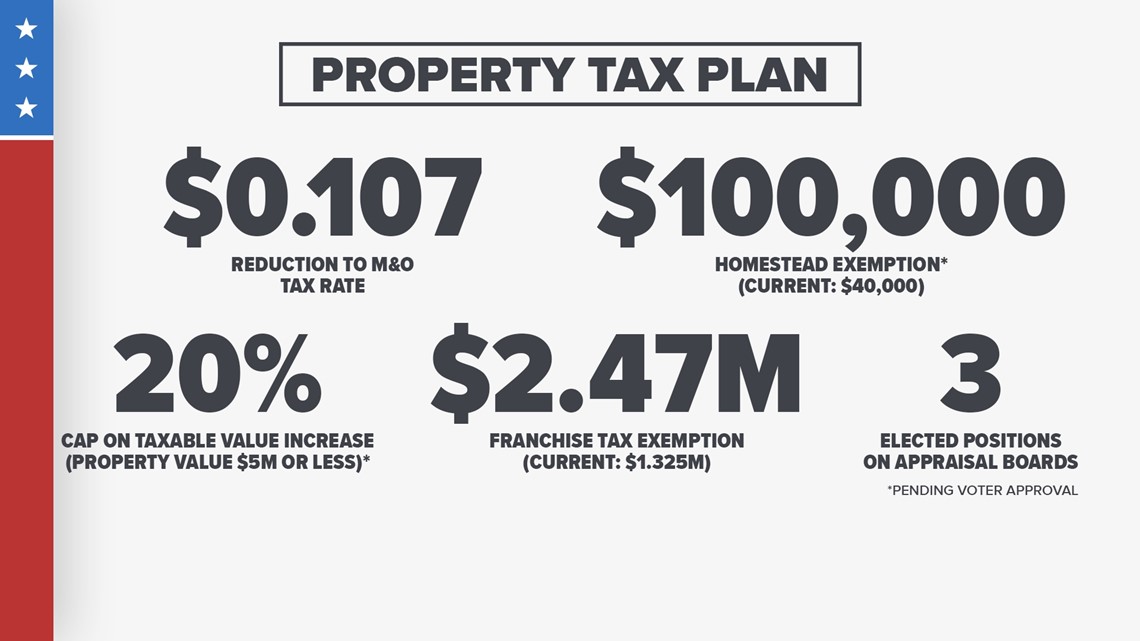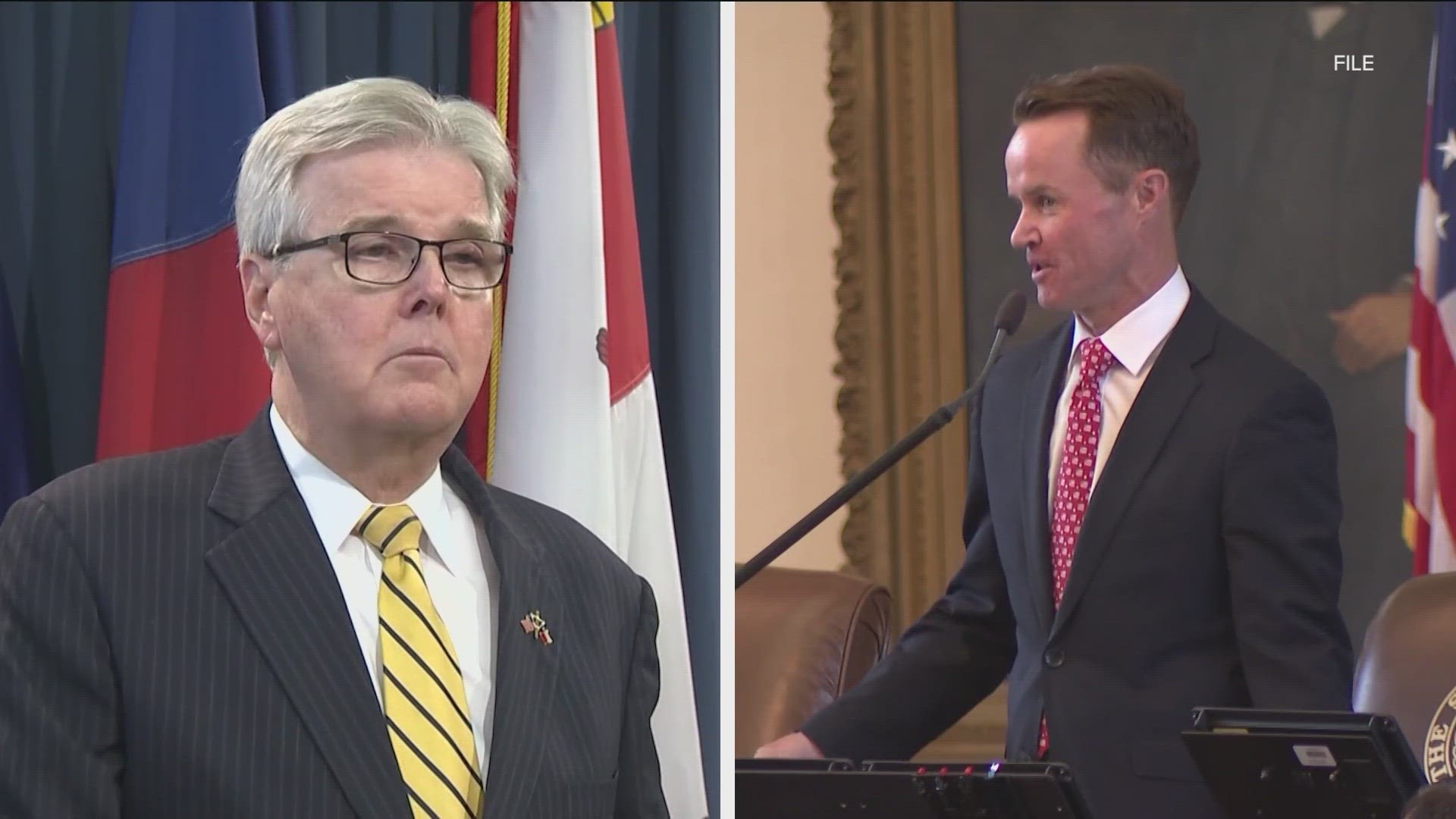AUSTIN, Texas — The Texas Senate and House have passed a historic $18 billion property tax cut.
The plan, comprised of two main bills and a constitutional amendment – Senate Bill 2, Senate Bill 3 and House Joint Resolution 2 – was passed by both the Texas House and Senate and will now head to Gov. Greg Abbott's desk, where he has said he will sign it.
Gov. Abbott released a statement shortly after the plan passed Thursday night:
"I made a promise to Texans during my campaign that the State of Texas would use at least $13.5 billion from our historic budget surplus to provide substantial relief to property taxpayers across Texas. Today, we will deliver even more with over $18 billion in property tax cuts. The Texas House and Senate fulfilled our promise with an agreement that delivers a comprehensive, long-lasting solution to increasingly burdensome property tax bills. I thank my partners in the Texas Legislature for coming together to honor the best interests of hardworking Texans who want to own their property—not rent it from the government. I look forward to signing this legislation into law to provide Texans with the largest property tax cut in Texas history.”
Texas Lt. Gov. Dan Patrick and House Speaker Dade Phelan each issued separate statements on Thursday night, commending the passage of the legislation:
"Today, the Senate unanimously passed House Joint Resolution 2, the final piece of the largest property tax relief package in Texas history, and likely the world. House Joint Resolution 2 authorizes a constitutional amendment election in November to allow for the provisions of Senate Bill 2 to be implemented. The impact of the $100,000 homestead exemption and the school district tax rate compression will be retroactive for the 2023 tax year to make sure Texans get maximum relief this year. Texans should take note of the November 7, 2023, constitutional amendment election date so they can vote in favor of this historic tax relief and several other key measures for the future of our state. In 2021, Texas voters enthusiastically approved the constitutional amendment to increase the homestead exemption to $40,000 and I have complete confidence they will do the same this year to increase the homestead exemption to $100,000." - Lt. Gov. Patrick
“I am thrilled to announce the overwhelming passage of the House and Senate’s omnibus property tax legislation. The passage of this $18 billion package is a testament to the unwavering commitment of Texas leaders to address the concerns of taxpayers and provide significant relief from the burden of escalating property taxes. I want to express my gratitude to the Lieutenant Governor for his productive negotiations on this matter, to State Representatives Will Metcalf, Morgan Meyer, and Charlie Geren for their relentless work to get these bills over the finish line, and to all the members who voted to give Texas property owners the largest state property tax cut in this nation’s history. Their dedication and leadership have been instrumental in making this historic achievement possible, and Texas taxpayers will be the winners because of it.” - Speaker Phelan
The $18 billion tax cut will include:
- Over $12 billion to be spent on reducing the school property tax rate for all homeowners and business properties by 10.7 cents
- Increase homestead exemption for homeowners from $40,000 to $100,000
- A 20% circuit breaker on appraised values as a three-year pilot project for non-homesteaded properties, valued at $5 million and under, including residential and commercial properties
- Savings on the franchise tax for small businesses and the creation of newly elected positions on local appraisal boards. It would increase the franchise tax exemption from $1 million to $2.47 million
- The resolution would create a three-year pilot program for all other property valued at $5 million or less, to cap increases on appraisal values


"Its appraisal cap is 20%, so there's some doubt, or at least some question, as to whether that's going to have a huge effect," said Karen Brooks Harper, state budget reporter for The Texas Tribune.
Brooks Harper said there was some give-and-take on both sides.
"The House didn't get, you know, all $18 billion going towards compression, going towards lowering school taxes," Brooks Harper said.
She said the House did get 70% of the new money to go towards it, along with a form of an appraisal cap.
As for the Senate, it got its homestead exemption, which Lt. Gov. Patrick said will increase tax relief for 5.7 million homeowners.
"If you live in your house for 25 years, a typical 25-year mortgage, that's over $25,000 year in savings over a lifetime"," Patrick said.
Last week, the Senate added an amendment that would give teachers a one-time bonus, but that didn't make it into this deal.
In a statement, Texas State Teachers Association President Ovidia Molina wrote:
"School districts are digging into their savings accounts and passing deficit budgets to give teachers and other employees much-needed pay raises because the legislative majority so far has refused to spend any of a record $33 billion budget surplus to increase public school funding.
"Now, the legislative leadership announces an $18 billion package of tax cuts with not an additional penny for the needs of educators and their students.
"We demand that state leaders also fulfill their constitutional duty and increase funding for public education, beginning with significant pay raises for all school employees in every school district."
Brooks Harper said renters also got the short end of the stick. They just have to hope the tax relief landlords get will trickle down to their monthly payments.
"There's no guarantee that they'll do that," Brooks Harper said. "There's a lot of folks that don't believe that they actually will lower their rates."
The House Ways and Means Committee heard public testimony on the bills on Tuesday afternoon.
Both bills – the omnibus tax relief bill and the franchise tax relief bill – will originate in the Texas Senate and a constitutional amendment will be introduced in the House as a House Joint Resolution (HJR).
The legislation was filed in both chambers on Monday, with both aiming to vote on the bills later this week. Both bills passed the House Thursday evening and are expected to be passed by the Senate Thursday night.
Once the governor has signed the bill, voters will cast ballots in November to possibly make it official by 2024.

